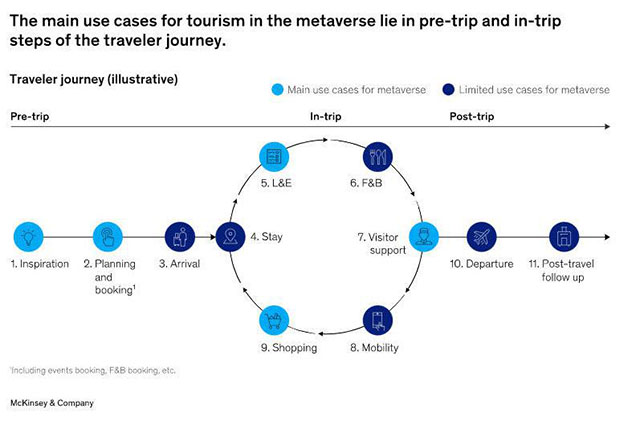The McKinsey report, "Value Creation in the Metaverse," estimates that the metaverse market is experiencing rapid growth and is expected to reach approximately $800 billion by 2025 and could exceed $1 trillion by 2030.

The gaming industry is on the front end of creating huge revenues. Among them are virtual game assets that already generate billions of dollars in revenue each year, including in-game items and virtual real estate. It is predicted that the virtual goods market alone could reach $150 billion in value by 2025.
The entertainment industry is attracting audiences with immersive experiences and virtual events in new ways, followed by retail, where virtual storefronts and personalized shopping experiences are starting to gain popularity, with estimates that virtual fashion and accessories sales will exceed $5 billion by 2025.

In the travel industry, the report highlights several examples of interest. Virtual tours allow travelers to virtually explore destinations and navigate landmarks, and this immersive virtual exploration can enhance trip planning, whet travel appetites and attract new customers.
In addition, Metaverse supports the creation of virtual travel experiences that allow everyone to participate in simulated adventures and activities from the comfort of their own homes. These experiences range from virtual city tours and historical reenactments to virtual hiking or diving expeditions. By offering virtual travel experiences, travel companies can cater to a broader audience.

The report also discusses the potential for tourism based on metaverse data customer service, where metaverse virtual travel agents can provide personalized travel recommendations, answer queries and assist travelers in real time, thereby increasing customer satisfaction and streamlining the booking process. This virtual customer service solution has the potential to bring 24/7 availability, scalability and cost effectiveness to travel companies.
In addition, the metaverse increases travel advertising and sponsorship, allowing brands to promote destinations, accommodations and experiential content based on the metaverse virtual space; virtual events and conferences held in the metaverse can attract a global audience, thus creating new avenues for advertising and revenue generation.
Finally, the report notes that the travel industry faces challenges in embracing the metaverse. Infrastructure requirements, data privacy and seamless integration with existing travel systems are areas that need to be addressed. Collaboration among travel companies, technology providers and policy makers is critical to creating a sustainable and secure metaverse ecosystem.




Comments5